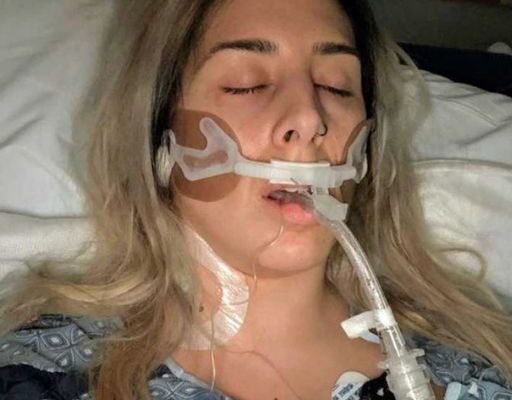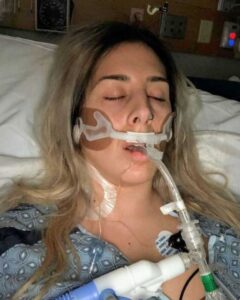It started with what felt like the flu.
Body aches. A weird fever that came and went. My stomach was off, I was dizzy, but I still dragged myself to work because that’s what you do, right? I thought maybe it was something I ate. Or maybe stress. I was always stressed.
By the third day, I couldn’t stand up without feeling like I was going to pass out.
I called urgent care. They told me to drink fluids and rest.
But that night, my hands turned red and started peeling. I could feel something wasn’t right. My heart was racing, my breathing felt off, and my skin looked like it was sunburned—but I hadn’t been outside.
That’s when I blacked out in my bathroom.
The next thing I remember was waking up in a hospital bed, cold and disoriented. My mom was sitting next to me, holding my hand. Her face was pale, her eyes wide with worry.
“Mom?” I croaked, my voice hoarse from dehydration.
“You’re okay,” she said softly, brushing my hair back. “You’re safe now.”
But I didn’t feel safe. I felt scared, confused, and incredibly weak. My head was pounding, and my body felt like it had been hit by a truck. What had happened? How had I ended up here?
“You collapsed in the bathroom,” my mom continued, her voice trembling. “You were unresponsive when I found you. I called 911 right away.”
I closed my eyes, trying to piece together the events of the past few days, but everything was foggy. I remember the fever. The red hands. The dizzy spells. But none of it made sense. What was going on with me?
The nurse came in shortly after, checking my vitals and offering me some water. I took a sip, but my throat was so dry it barely helped. Then, she said the words that made my stomach drop:
“You were diagnosed with Toxic Shock Syndrome.”
The words echoed in my head. Toxic Shock Syndrome? But that was something I’d only ever heard about in passing—something that happened to other people, not to me.
I looked at the nurse, wide-eyed. “Toxic Shock Syndrome? But how? I— I didn’t think I was at risk.”
She nodded sympathetically. “It’s more common than people realize, and it doesn’t always follow the obvious signs. You had some classic symptoms—fever, rash, dizziness, the peeling skin. It can come on quickly, and when it does, it’s serious. But you’re lucky we caught it in time.”
I tried to process what she was saying, but it was hard to wrap my head around the fact that I could have been in such grave danger. My mind raced through the past few days, trying to figure out how I could have ended up in this situation.
It turned out that the culprit had been a tampon I had used—something I had never given much thought to. The nurse explained that, while Toxic Shock Syndrome was rare, it was often associated with certain types of menstrual products, especially when left in too long. The bacteria, usually Staphylococcus aureus, had somehow made its way into my bloodstream, causing a rapid, life-threatening infection.
“I’ve always used tampons before,” I said, my voice trembling. “I never thought anything could happen.”
The nurse sighed, sitting down beside me. “That’s the thing. Most people don’t. It’s easy to overlook the risks, but it’s important to change them regularly and follow proper hygiene. Sometimes, it only takes one slip-up.”
The more she talked, the more I realized how lucky I was. I had nearly died from something so preventable, something I had taken for granted all my life. The guilt washed over me. Why hadn’t I paid more attention to the warnings? Why hadn’t I listened to my body sooner when it started signaling that something was wrong?
I spent the next few days in the hospital, hooked up to IVs and being closely monitored. The doctors worked to flush the toxins from my body, and my mom never left my side. But what hit me hardest was the realization that, if I had waited even a few more hours, it might have been too late. Toxic Shock Syndrome can be fatal if untreated, and I could have been another statistic—another person whose story went unnoticed until it was too late.
When I was finally discharged, I was a different person. The physical recovery took weeks, but the emotional recovery would take much longer. I couldn’t stop thinking about how close I had come to losing everything. How many others like me might be walking around unaware of the silent dangers lurking in their daily lives?
I couldn’t keep this to myself. I had to share my story.
I began talking openly about what had happened to me, hoping to raise awareness. It was uncomfortable at first. I had always been a private person, and the idea of discussing something as personal as menstrual health with others was nerve-wracking. But the more I spoke, the more I realized how many people didn’t know about Toxic Shock Syndrome. How many women were just like me—going through life with little knowledge of the risks, taking their health for granted, trusting that they were invincible.
The most surprising part was the reaction I got. Many of my friends and family members reached out to share their own experiences or to thank me for speaking up. Some had heard of Toxic Shock Syndrome but didn’t realize how serious it could be. Others were shocked to learn that it could happen to anyone—healthy, active, seemingly invincible people like me.
And that’s when it happened. The twist.
A few weeks after I shared my story on social media, I received a message from a woman I didn’t know. She told me that she had seen my post and immediately went to the doctor. She’d been feeling unwell for a few days, but had dismissed it as a bad cold. After reading my story, she recognized the symptoms and rushed to get checked. Turns out, she had been in the early stages of Toxic Shock Syndrome. The doctor caught it in time, and she was able to recover without any lasting complications. She thanked me for saving her life, saying that if she hadn’t read my post, she would have never known to seek help.
The weight of that hit me harder than anything else. I had done something good. Something that mattered. My story had helped someone, saved someone. And I realized, in that moment, that sometimes the worst things we go through can end up being the catalyst for positive change.
It wasn’t just me anymore. It was a community of people learning, growing, and supporting one another. And through that support, we all became stronger.
In the end, I didn’t just recover physically. I recovered in a deeper way—emotionally, mentally, and spiritually. I learned that the body will always give us signals, and it’s our responsibility to listen. I learned that no one is invincible, but we can all be survivors if we trust our instincts and take care of ourselves.
I also realized that sharing our struggles is not a weakness—it’s a strength. By being vulnerable, we create the opportunity for others to heal, to learn, and to grow.
So, if you’re reading this and you’ve ever dismissed something in your life as “just a small issue,” I encourage you to take a step back and listen to your body. Don’t ignore the signs. And if you have a story, don’t be afraid to share it. You never know who you might help along the way.
Please share this post with someone who needs to hear it today. You might just be saving a life—just like someone did for me.




